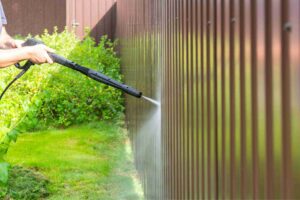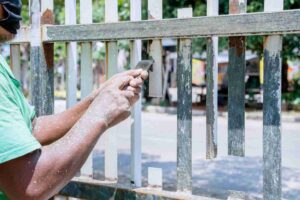How Long Does a Vinyl Fence Last?
When installing a fence around your home, it’s important to choose a material that can withstand the elements and natural deterioration while maintaining its integrity and appearance. Vinyl fencing checks these boxes exceptionally well. So how long does a vinyl fence last? The exact answer can vary based on different factors. Here’s a look into the average lifespan of vinyl fences as well as some tips for making this long-lasting and resilient fencing option last as long as possible.
What Is Vinyl Fencing?
Vinyl fences are made from a strong thermoplastic material called polyvinyl chloride (PVC). PVC’s weather-resistance and structural durability enables vinyl fencing to hold its shape in most conditions without warping. And for homeowners who value aesthetics, it also comes in a wide range of colors and fence designs, enhancing curb appeal.
Here are some of the advantages to consider when installing this type of fence:
- As long as you clean it on a consistent basis to remove grime or mildew, vinyl fencing rarely needs maintenance or repairs, making it a convenient, hassle-free option.
- Vinyl fences are built to hold up against all sorts of weather — from strong winds, to temperature changes, to moisture and precipitation.
- Due to its sturdy construction, vinyl fencing will not easily break. There are exceptions (like a direct hit from heavy debris, a golf ball, or hail, for example), but this material is known for durability.
- Vinyl fencing tends to last much longer than wood. Over time, wood fences can rot, fade, warp, chip, or decay, whereas vinyl is resistant to these types of damage.
How Long Does a Vinyl Fence Last?
As long as it’s correctly installed and well maintained, the average vinyl fence lifespan is around 20–30 years. How long a vinyl fence lasts depend on several factors, including:
- Climate: Vinyl fences can stand up to all sorts of outdoor elements. But if you live in a climate with harsh sunlight or extreme temperatures for prolonged amounts of time, vinyl fencing can become brittle and prone to cracking. Installing your fence in the winter can also have a serious impact on its longevity, so utilizing a contractor that has experience in your climate is important.
- Debris: Vinyl is one of the most durable fencing materials out there, but it’s not entirely indestructible. Impacts from lawn equipment, fallen tree limbs, large rocks, and other debris can puncture the fence and inflict cosmetic or structural damage.
- Cleaning: Vinyl fences are low-maintenance, but that doesn’t mean they can go without TLC. In order to ensure a long vinyl fence lifespan, make sure to clean the whole fence on a regular basis and prune all trees or vegetation around it.
How long does a vinyl fence last compared to other common fencing materials? With the right maintenance, all fences can be resilient, but some tend to hold their shape better than others. Below is a rundown of how the average vinyl fence lifespan stacks up against its wood, aluminum, and chain link counterparts:
- Wood: 20 years
- Aluminum: 50 years
- Chain Link: 15 years
How to Increase Your Vinyl Fence Lifespan
As you can see, the lifespan of a vinyl fence can vary by up to 10 years. Now that you know how long a vinyl fence should be able to last, let’s take a look at some steps that can help you maximize its lifespan.
Fortunately, there are several easy and effective ways to maintain the structural integrity, aesthetic appearance, and practical function of vinyl fencing. By following these tips below, you can ensure your newly installed vinyl fence remains in great condition for decades to come.
- Use high quality materials: Not all PVC is created with the same level of strength and resistance. It’s critical to select a top-quality grade that’s invulnerable to cracks, punctures, and other damage. Make sure the fencing manufacturer has a solid reputation for using trusted, premium materials.
- Consider the foundation: The location where you install a fence matters as well. Over time, soil conditions will often shift or erode, which can loosen the posts and cause an uneven fence line or structural instability. To mitigate this, hire a professional contractor to help you choose the optimal foundation for your fence.
- Don’t install it yourself: While you might be tempted to cut costs, installing vinyl fencing is probably not the best DIY project for homeowners. Many variables factor into professional fence installation, such as how deep to make each hole in the ground or how much space to leave between the fence posts. From start to finish, installation requires precision and attention to detail, so work with experienced technicians who will do it correctly the first time.
- Watch out for nearby foliage: First off, constructing fences near trees requires special consideration and planning. If you have trees or other landscaping near the fence, you’ll want to prune them back periodically. This helps lower the risk of any forceful impacts. Speaking of which, be careful not to collide with the fence while operating heavy, powerful machinery like lawn mowers or edge trimmers — vinyl fences are sturdy, but they’re not impact-resistant.
- Take care of your fence: While we’ve mentioned this one already, it’s worth repeating. The number-one way to extend a vinyl fence lifespan is to clean it consistently. Over time, mildew, grime, and other unsightly stains will build up, and without frequent cleaning, they can seep into the structural framework. About once a month, you’ll need to give the fence a scrub-down with a pressure hose or by hand.
Maximize Your Vinyl Fence’s Lifespan with Expert Installation
It’s no wonder vinyl fencing is such a popular choice among homeowners given its weather resistance and structural durability — not to mention its aesthetic appeal. But a long potential lifespan doesn’t necessarily guarantee a long life. By following the tips above you can ensure your vinyl fence stands strong and appealing for decades.


